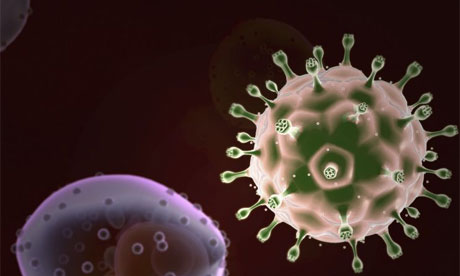HIV breakthrough as scientists discover new vaccine to prevent infection
First evidence of possible vaccine as US military-backed medical trial in Thailand cuts HIV infection rate by a thirdSarah Boseley, health editor, and Haroon Siddique guardian.co.uk, Thursday 24 September 2009 11.20 BST Article history
A microscopic image of the HIV virus.

A medical trial in Thailand has raised hopes of a major breakthrough in the fight against Aids after scientists said an experimental vaccine had reduced the risk of HIV infection by a third.
The world's largest HIV/Aids vaccine trial of more than 16,000 volunteers was the first in which infection has been prevented, according to the US army, which sponsored the trial with the National Institute of Allergy and Infectious Diseases.
A combination of two vaccines was tested on HIV-negative Thai men and women aged 18 to 30 at average risk of becoming infected. All the volunteers were given counselling and condoms to help them avoid HIV. Then half were randomly picked to receive the vaccine, while the other half got dummy shots. Until the trial ended, nobody knew who had been given the genuine vaccine and who had not.
A relatively small number of people became infected with HIV – 51 of the 8,197 people given the vaccine, and 74 of the 8,198 who received dummy shots – but the difference was statistically significant, which means scientists believe it could not have happened by chance. It worked out at a 31% lower risk of infection for the vaccine group.
Colonel Jerome Kim, who helped to lead the $105m (£64m) study for the US army, said it was "the first evidence that we could have a safe and effective preventive vaccine".
Recent failures had led many scientists to believe that such a vaccine might not be achievable. In 2007, the drug company Merck abandoned what had looked at the time like the most promising avenue of research after disappointing trial results. Today the National Institute's director, Dr Anthony Fauci, warned it was "not the end of the road", but said he was surprised and very pleased by the outcome.
"It gives me cautious optimism about the possibility of improving this result," he said. "This is something that we can do."
Every day, 7,000 people worldwide are newly infected with HIV; 2 million died of Aids in 2007, the UN agency Unaids estimates.
The Aids Vaccine Advocacy Coalition, an international group that has worked towards developing a vaccine, welcomed the results of the trial – the third major study since 1983, when HIV was identified as the cause of Aids – as "a historic milestone".
The executive director, Mitchell Warren, said: "There is little doubt that this finding will energise and redirect the Aids vaccine field."
Frances Gotch, professor of immunology at Imperial College London, said the results appeared to be statistically significant and may have been the effect of the two different vaccines working in tandem to more powerful effect.
"The fact that they have seen a response with people with such a low incidence of infection is impressive," Gotch, who is also the principal investigator for the International Aids Vaccine Initiative, told the Guardian.
"Of course it's not 100% of people [protected] but 31% could make an enormous difference in the world. I think this is something we can work with."
Thailand's ministry of public health conducted the study, which used strains of HIV common in Thailand.
Scientists stressed it was not known whether such a vaccine would work against other strains elsewhere in the world. The study was done in Thailand because US army scientists carried out pivotal research in that country when the Aids epidemic emerged there, isolating virus strains and providing genetic information on them to vaccine makers.
The study tested a two-vaccine combination in a "prime-boost" approach, where the first one primes the immune system to attack the HIV virus, and the second one strengthens the response.
Alvac uses canarypox, a bird virus, altered so it can't cause human disease, to ferry synthetic versions of three HIV genes into the body. AidsVax contains a genetically engineered version of a protein on HIV's surface.
It is unclear whether vaccine makers will seek to license the two-vaccine combination in Thailand. Before the trial began, the US Food and Drug Administration said other studies would be needed before the vaccine could be considered for US licensing. The full results of the trial will be presented at an international Aids vaccine conference in Paris in October.
The executive director of the Global HIV Vaccine Enterprise, an alliance of research bodies and funders like the Gates Foundation, said the results showed a vaccine was an achievable goal. "This is a historic day in the 26-year quest to develop an Aids vaccine," said Dr Alan Bernstein. "This trial is the first demonstration in humans that, with more research, it will be possible to develop a vaccine that is fully protective against HIV."
Deborah Jack, chief executive of the National Aids Trust in the UK, said a vaccine, by far the most effective way of tackling serious infectious diseases, was desperately needed. More work was needed, but the promising findings "justify the continuing investments and efforts of the international community, including the UK government, to develop a vaccine."
The Terrence Higgins Trust said it was treating the results with "cautious optimism".
"This is the first step on a very long road," said the policy manager, Vicky Sheard.
"There's a lot of research needed into how a vaccine can be rolled out, how costly it's going to be, whether it's going to be effective against different strains."